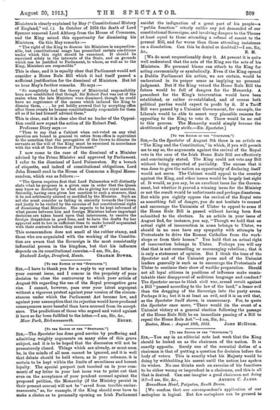[To THE EDITOR OP SHE " SPECTATOR."] SIR, — The Spectator has
done good service by proffering and admitting weighty arguments on many sides of this grave subject, and it is to be hoped that the discussion will not be prematurely closed. Things which are already, or must soon be, in the minds of all men cannot be ignored, and it is well that debate should be held where, as in your columns, it is certain to be kept within the limits of seemliness and honest loyalty. The special purport (uot touched on in your com- ment) of my letter in your last issue was to point out that even on the acceptance of your prudent counsel against the proposed petition, the Monarchy (if the Ministry persist in their present course) will not be "saved from terrible embar- rassments," as, for example, if the King should ever have to make a choice as to personally opening an Irish Parliament
amidst the indignation of a great part of his people—a "public function" utterly unlike any yet demanded of our constitutional Sovereigns, and involving dangers to the Throne at least equal to those attending a refusal of assent to the present Bill, and far worse than those attending insistence on a dissolution. Can this be denied or doubted ?—I am, Sir,
[We do most unquestionably deny it. At present it is quite well understood that the acts of the King are the acts of his Ministers. No personal blame can attach to the King for acting ceremonially or symbolically. Even if the King opened a Dublin Parliament his action, we are certain, would be understood in its proper sense as implying no personal judgment. But if the King vetoed the Home Rule Bill the future would be full of dangers for the Monarchy. A precedent for the King's intervention would have been established, or rather re-established, and of course both political parties would expect to profit by it. If a Tariff Bill were passed by a Unionist Government, for example, the Liberals would be able to assert very plausible reasons for appealing to the King to veto it. There would be no end to this process. The Monarchy would simply become the shuttlecock of party strife.—En. Spectator.]


































 Previous page
Previous page